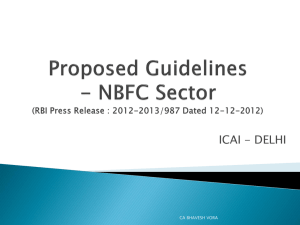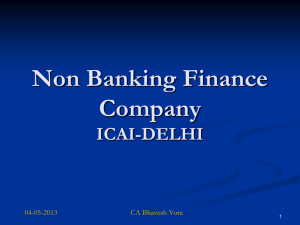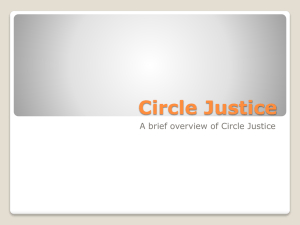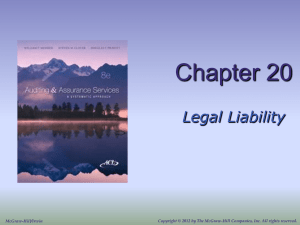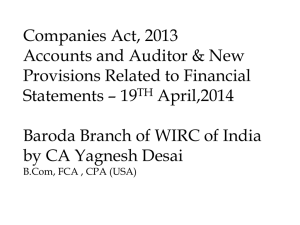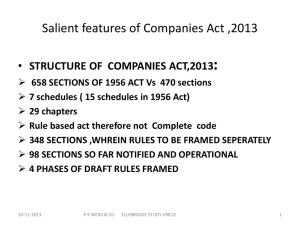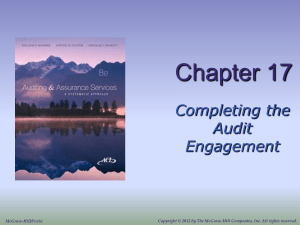NBFC Auditors Report Directions, 2008
advertisement
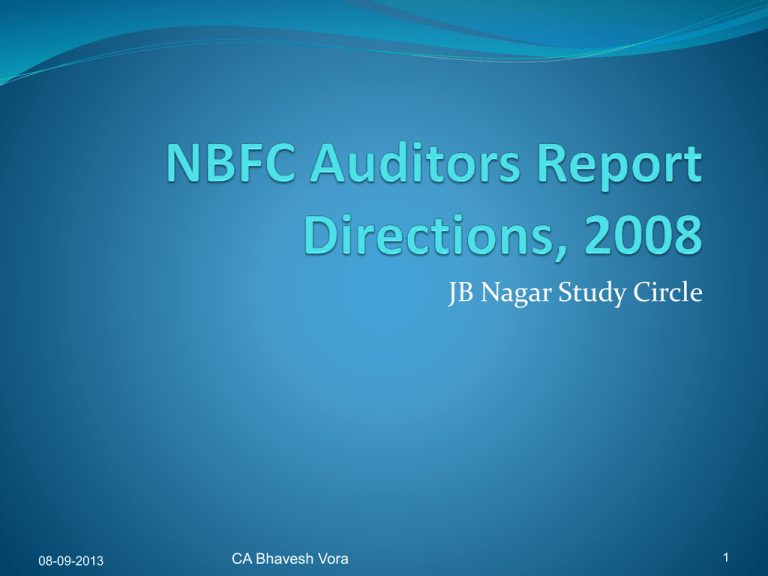
JB Nagar Study Circle 08-09-2013 CA Bhavesh Vora 1 Coverage Introduction Auditor’s Report (Reserve Bank) Directions, 2008 Important audit points Other important areas of compliances Standards of Auditing Penalties under RBI Act, 1934 08-09-2013 CA Bhavesh Vora JB Nagar CPE Study Circle 2 Introduction The auditor’s report directions are issued by Reserve Bank as per powers conferred u/s 45MA of Reserve Bank of India Act, 1934 In the public interest In the interest of the depositors For the purpose of proper assessment of the books of accounts Auditor’s report (Reserve Bank) Directions, 1998 repealed 08-09-2013 CA Bhavesh Vora JB Nagar CPE Study Circle 3 Auditor’s Report Directions Applicability Separate Report to Board of Directors Deposit/Non-Deposit taking NBFCs Exception report to RBI 08-09-2013 CA Bhavesh Vora JB Nagar CPE Study Circle 4 Auditor’s Report Applicability The directions applies to Auditors of all registered and Non-Registered (Deemed NBFCs) whether Deposit Accepting or Non-Accepting. Auditors to submit additional Report to the Board of Directors The auditor to make a separate report to the Board of Directors of the NBFC (including deemed NBFCs) on the matters specified in the directions. 08-09-2013 CA Bhavesh Vora JB Nagar CPE Study Circle 5 Auditor’s Report…Cont Matters to be included in the auditor’s report The auditor’s report shall include a statement on the following matters, namely: In the case of all Non-Banking Financial Companies I. Whether the company is engaged in the business of NBFI and whether it has obtained a Certificate of Registration (CoR) from the Bank (Since the clause specifically mentions about obtaining Certificate of Registration, the clause is applicable to all those companies fulfilling criteria of 50% Financial Assets and 50% Income out of Financial Assets.) 08-09-2013 CA Bhavesh Vora JB Nagar CPE Study Circle 6 Auditor’s Report…Cont II. Whether the company is entitled to continue to hold CoR. -Asset Income Pattern as on March 31 of the applicable year -Auditor to issue the certificate to the Company III. Asset Finance Companies: Whether correctly classified. Principal Business Criteria – 60% instead of 50% IV. Whether NBFC-MFI (Micro Finance Institutions) has been correctly classified 08-09-2013 CA Bhavesh Vora JB Nagar CPE Study Circle 7 Auditor’s Report…Cont Points to be reported in case of NBFCs holding/accepting Public Deposits i. Quantum within Prescribed Limit? ii. Excess deposits has been regularized? iii. Acceptance of Public Deposit without Minimum Investment Grade Credit Rating? iv. Credit Rating obtained is in Force? Aggregate Deposits are as per limits specified in the ratings? v. NOF level Rs. 200 Lacs? if no, whether deposits are frozen/brought down? 08-09-2013 CA Bhavesh Vora JB Nagar CPE Study Circle 8 Auditor’s Report…Cont (vi) Default in repayment of principal or interest by the NBFC? (vii) Prudential Norms Compliances • Income recognition, • Accounting standards, • Asset classification, • Provisioning for bad and doubtful debts, • Concentration of credit/investments, etc 08-09-2013 CA Bhavesh Vora JB Nagar CPE Study Circle 9 Auditor’s Report…Cont (viii) Capital Adequacy Ratio – correctly determined in returns filed? Whether CRAR is as per minimum prescribed? (ix) Liquid Assets Requirements – Maintenance and communicating to regional office (x) Return in NBS-1 filed within stipulated period? (xi) Half yearly return on prudential norms (xii) Compliance in relation to opening of new branch/office to collect deposits/ closure/ appointment of agent 08-09-2013 CA Bhavesh Vora JB Nagar CPE Study Circle 10 Auditor’s Report… Reporting in case of Non-banking financial company NOT accepting public deposits Apart from the enumerated aspects applicable for all NBFCs - the auditor shall include a statement on the following matters, namely:1. 2. 3. Resolution for non-acceptance of Public Deposits Accepted any deposits? Compliance with Prudential Norms 08-09-2013 Income recognition Accounting standards Asset classification and provisioning for bad and doubtful debts CA Bhavesh Vora JB Nagar CPE Study Circle 11 Auditor’s Report… In respect of Systemically Important Non-deposit taking NBFCs (a) CRAR as disclosed in NBS- 7 return, has been correctly arrived at and whether such ratio is in compliance with the minimum CRAR prescribed by the Bank; (b) Furnished to the Bank the (NBS-7) within the stipulated period* *Quarterly within 15 days of the end of the Quarter In case of companies that has obtained advice from RBI Auditor’s statement on whether the company has obtained a specific advice from RBI? Whether those conditions are complied? 08-09-2013 CA Bhavesh Vora JB Nagar CPE Study Circle 12 Auditor’s Report… Clause 4. Reasons to be stated for unfavorable or qualified statements - Reason for unfavorable or qualified statement - Unable to express any opinion on any of the items, indicate such fact together with reasons thereof. 08-09-2013 CA Bhavesh Vora JB Nagar CPE Study Circle 13 Auditor’s Report… Obligation of auditor to submit an exception report to RBI Any statement is unfavorable or qualified, or in the opinion of the auditor the company has not complied with: (a) The Chapter IIIB of RBI Act, 1934 (b) The NBFC Acceptance of Public Deposits (RBI) Directions, 1998; or (c) NBF (Deposit Accepting or Holding) Companies Prudential Norms (Reserve Bank) Directions, 2007; or (d) NBF (Non- Deposit Accepting or Holding) Companies Prudential Norms (Reserve Bank) Directions, 2007; 08-09-2013 CA Bhavesh Vora JB Nagar CPE Study Circle 14 Auditor’s Report… Report to regional office - details of unfavorable or qualified statements and about the non-compliance in respect of the company. Matters to be included in letter to RBI Board report and the letter to RBI should be in sync Discussion with the client Letter received by auditors directly from RBI Proposed Remedial Measures 08-09-2013 CA Bhavesh Vora JB Nagar CPE Study Circle 15 Important Audit Points Investment Accounting NPA Accounting and provisioning Capital Adequacy Income Recognition Asset Size Asset Income Pattern KYC Compliances PMLA Compliances 08-09-2013 CA Bhavesh Vora JB Nagar CPE Study Circle 16 Provisioning Norms Standard Assets 0.25% of standard assets (Notification dated 17th January, 2011) Sub standard assets Non performing assets for a period of 18 months. Renegotiated loans upto one year of satisfactory performance of new terms. Provide 10% on the outstanding amount No specific provisions regarding Security Doubtful Assets Remains sub standard asset for period of 18 months and above Provide 100% of uncovered outstanding amount 08-09-2013 CA Bhavesh Vora JB Nagar CPE Study Circle 17 Provisioning Norms To the extent of unsecured loan which is covered by value of realizable securities, the provisioning required based on the period the asset has remained doubtful i. upto one year - 20%, ii. one to three year - 30%, iii. more than three years - 50% Loss Assets Identified by the Company, its Auditors or RBI (Period is not specified) or Potential threat of Non Recoverability due to erosion in the value of securities or non availability of security or any fraudulent act or omission on the part of the borrower 100% Write off in the books (Same treatment for the Interest) 08-09-2013 CA Bhavesh Vora JB Nagar CPE Study Circle 18 Other Important Norms Investment policy to be framed for classification of investments into long term and short term Board of Directors to Frame policy for granting call/demand loans and implement the same Framing of Fair practice code as per guidelines given in circular Interest rate policy Asset classification into Standard, Sub standard, Doubtful and loss assets and provisioning requirements on these assets 08-09-2013 CA Bhavesh Vora JB Nagar CPE Study Circle 19 Other Important Prudential Norms.. Various disclosures should be made in the Balance sheet Formation of audit committee Schedule to be appended to the balance sheet Submission of statutory auditor’s certificate Cannot give loan against own shares Communicate within 30 days important changes as prescribed 08-09-2013 CA Bhavesh Vora JB Nagar CPE Study Circle 20 Standards on Auditing All standards on auditing are applicable. However, following standards requires special attention SA 240 – Auditor’s responsibility relating to Fraud in an audit of financial statements SA 250 – Consideration of Laws and Regulations in an Audit of Financial Statements SA 265 – Communicating deficiencies in Internal Controls to those charged with Governance SA 610 – Using the work of Internal Auditors SA 620 – Using the work of an Auditor’s Expert 08-09-2013 CA Bhavesh Vora JB Nagar CPE Study Circle 21 Penalty Deposit Reporting NBFC ought to file statements relating to Deposits accepted. If not filed, then auditor should make a report to RBI giving the aggregate amount of such deposits by the NBFI. (Section 45MA (1)) RBI Directions to Auditors RBI direction to NBFC/Auditors of such NBFC in relation to books of accounts, balance sheet, profit and loss accounts, disclosures of liabilities in the books of accounts or any matters relating thereto for the purpose of proper assessment of the books of accounts. ((Section 45MA (1A)) Report U/s 227 of Companies Act, 1956 Report under section 227(2) of companies act, 1956 should include the contents of report made under section 45MA(1A) about deposits held by the NBFC. (Sec 45MA(2)) Penalty : Rs. 5000/- for contravening the directions given u/s 45MA (Section 58B (4AA)) 08-09-2013 CA Bhavesh Vora JB Nagar CPE Study Circle 22 JB Nagar Study Circle 08-09-2013 CA Bhavesh Vora 23

